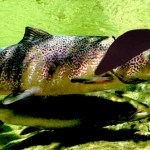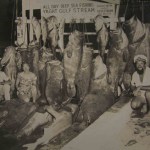Shifting Baselines
Maya Lin, the architect behind the Vietnam memorial in Washington D.C. among other endeavors, thought she would not be making any more memorials. But her latest and last memorial focuses on the loss of biodiversity using animal sounds and is called "What is missing?". The interactive project is newly installed at the California Academy of Sciences and is designed to show us what we've lost and what we stand to lose. Listen to her talking about her listening cones as a wake up call for humanity, which will be installed in many science museums around the world, at On Point at NPR. Keep a…
Oliver Morton wrote a delightful book all about photosynthesis called Eating the Sun: How Plants Power the Planet, which I reviewed earlier this year for Search Magazine (R.I.P.) under the title "A Song for the Heartless". One of my favorite passages in the book beautifully explains the difference between art and science:
Discoveries feel determined. They are there to be made, and if one person doesn't, another will. This doesn't lessen the achievement; indeed it can give it spice. The thought that 'this is the way the world is--and I am the first to see it as such' is an intoxicating…
Myopic spot-prawn lovers might not like the idea of closing some of the oceans to fishing, but California is creating a network of marine protected areas (MPAs) along its coast for one simple reason -- MPAs work. Research by Callum Roberts et al. (2001) published in Science found:
a network of five small reserves in St. Lucia increased adjacent catches of artisanal fishers by between 46 and 90%, depending on the type of gear the fishers used. In Florida, reserve zones in the Merritt Island National Wildlife Refuge have supplied increasing numbers of world record-sized fish to adjacent…
I know it sounds a bit like the Onion headline "New Starbucks Opens In Rest Room Of Existing Starbucks" but it's true: after more than a century of absence, scientists recently discovered wild young Atlantic salmon in New York's Salmon River. The Salmon River, as its name implies, once hosted an abundance of Salmo salar but by the late 1800's, Atlantic salmon disappeared due to usual set of anthropogenic culprits: damming of tributaries, overfishing, deforestation, and pollution. Of course, this wild fish is the spawn of a repatriation project using hatchery-reared yearlings, but it's…
Many thanks to Mike HIrshfield at Oceana for sending along this little piece of good news: Atlantic salmon have returned to the Seine River. After having disappeared for nearly a century due to dams, overfishing, and pollution, hundreds of Atlantic salmon are swimming past the Eiffel Tower this year. The reason? Scientists say it's simple: cleaner water.
Bonjour! Salmon are back in the Seine...
The American press is on suicide watch as Frank Rich declared earlier this year. With the fold of major print media outlets, like Rocky Mountain News, and the Seattle P-I and the bankruptcy of the chain that owns the Los Angeles Times and the Chicago Tribune, it seems that the predictions of the EPIC 2014 slideshow are right and that Frank Rich is, too.
So why would a photojournalist say: "As long I as I am alive, newspapers will be, too"?
Yet this was the battlecry of photographer Michel du Cille, who I had the pleasure to hear speak last Saturday at the Bellingham Visual Journalism…
There are obvious hazards associated with forgetting, such as angry women (think birthdays and anniversaries) and the shifting baselines syndrome, where we come to accept degraded environments as 'natural'.
Forgetting about the past is particularly dangerous when it comes to making decisions about the future. I think this was summed up well in an article on Alzheimer's titled Probing a Mind for a Cure in The Philadelphia Inquirer.
"Their frame of reference is disappearing," said Christopher Clark, director of Penn's Memory Discorders Clinic and Bob Moore's doctor after his diagnosis [with…
I know that the year is far from over, but Loren McClenachan, who works with Jeremy Jackson at the Scripps Institution of Oceanography, has what I believe is the shifting baselines story of 2009.
Just to review from the old shifting baselines days, the shifting baselines syndrome implies that there is some sort of change through time (e.g. a population decline) and that that change must have been forgotten, and this leads to collective amnesia of what is natural or pristine. Pauly outlined this idea in his paper in 1995 and then called for the incorporation of unconventional data sources (…
It is already February! And I cannot believe I let so many January stories get away from me. So I would like a recap a few of shifting baselines repute now:
1) This article, Deep Sea-crets, ran in the San Diego Union Tribune about a recent expedition to explore deep undersea mounts in the Gulf of California:
What the scientists found was both exhilarating and disheartening. In some of the deeper and more remote locations, such as Las Animas, a seamount midway between the towns of Loreto and La Paz, marine life was both abundant and diverse.
Researchers recorded prosperous fish populations…


